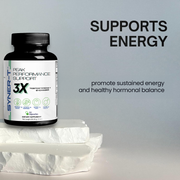In this article, we'll explore various effective strategies to increase nutrient absorption. From eating a well-balanced diet to managing stress levels and optimizing gut health, each step plays a significant role in enhancing nutrient utilization and improving your nutrient absorption rate.
Key Takeaways:
- Optimizing nutrient absorption can lead to better digestion and overall well-being.
- Eating a well-balanced diet, chewing food thoroughly, and incorporating fermented foods can optimize nutrient absorption.
- Managing stress levels, staying hydrated, and avoiding overconsumption of medications can enhance nutrient utilization.
- Consulting with a healthcare professional can provide personalized recommendations to improve nutrient absorption.
- Regular exercise can improve nutrient absorption and promote better overall health.

Understanding Nutrient Absorption
In order to effectively increase nutrient absorption, it's important to understand the process by which your body absorbs nutrients. Nutrient absorption primarily occurs in the small intestine, where nutrients from the foods you eat are broken down and absorbed into the bloodstream. By enhancing nutrient uptake and maximizing nutrient assimilation in this process, you can improve overall nutrient absorption.The small intestine is lined with villi and microvilli, which increase the surface area available for nutrient absorption. Nutrients are transported across the intestinal wall and into the bloodstream, where they are carried to the liver and then throughout the body to be utilized.
There are several factors that can impact nutrient absorption, including the health of your gut, the balance of beneficial bacteria in your gut microbiome, and your body's ability to produce digestive enzymes. By enhancing these factors, you can improve nutrient uptake and maximize nutrient assimilation.
Optimizing nutrient absorption is essential for promoting overall health and wellness. By enhancing nutrient uptake, you can ensure that your body is getting the most out of the foods you eat and maximizing nutrient assimilation.
Eat a Balanced Diet
One of the most effective ways to optimize nutrient absorption is by eating a balanced diet. Consuming a variety of nutrient-rich foods ensures that you are getting a wide range of essential vitamins and minerals. Fruits, vegetables, whole grains, lean proteins, and healthy fats should make up the bulk of your diet.Additionally, consuming enough dietary fiber can help improve digestion and optimize nutrient absorption. Fiber-rich foods like fruits, vegetables, whole grains, and legumes can help regulate bowel movements and prevent constipation, allowing for better nutrient absorption.
Chew Your Food Thoroughly
If you're looking to enhance nutrient uptake and improve digestion, one simple but effective strategy is to chew your food thoroughly. By breaking down food into smaller particles, you make it easier for your body to digest and absorb the nutrients. Aim to chew each bite at least 20-30 times before swallowing to maximize nutrient absorption.Chewing your food thoroughly also promotes a feeling of fullness, which can prevent overeating and support healthy weight management. By taking the time to chew your food properly, you can support your body's natural digestive processes and enhance nutrient uptake.

Incorporate Fermented Foods
If you're looking to optimize nutrient absorption, one effective strategy is to incorporate fermented foods into your diet. Fermented foods like yogurt, sauerkraut, and kimchi are rich in probiotics, beneficial bacteria that promote a healthy gut. These probiotics can increase nutrient bioavailability and enhance the absorption of certain vitamins and minerals.Research shows that consuming fermented foods can improve gut health, enhance nutrient uptake, and stimulate nutrient absorption in the small intestine. Additionally, these foods are often rich in other essential nutrients like vitamin K2, which plays a role in bone health and heart health.
When selecting fermented foods, aim for options that are low in added sugars and preservatives. You can also make your own fermented foods at home using simple recipes and techniques.
Consume Healthy Fats
Healthy fats, such as those found in avocados, nuts, seeds, and fatty fish, are essential for enhancing nutrient utilization and optimizing nutrient absorption. Certain vitamins, like vitamins A, D, E, and K, are fat-soluble, meaning they require fat to be properly absorbed by the body. Adding healthy fats to your meals can optimize nutrient absorption and enhance nutrient utilization.Pro tip:
Try topping your salad with a handful of nuts or seeds, or adding avocado to your sandwich or wrap. Incorporating healthy fats into your meals can not only enhance nutrient absorption but also add delicious flavor and texture.
Pair Nutrient-Rich Foods
By pairing certain nutrient-rich foods together, you can maximize nutrient assimilation and boost overall nutrient absorption. Some nutrients work synergistically to enhance their absorption, while others can inhibit absorption when consumed together. By following these tips, you can optimize your nutrient intake:- Incorporate vitamin C-rich foods, such as citrus fruits, bell peppers, and strawberries, with iron-rich foods like spinach, beans, and red meat to increase iron absorption.
- Combine vitamin D-rich foods, like fatty fish, mushrooms, and fortified dairy products, with calcium-rich foods such as leafy greens, almonds, and tofu for better calcium absorption.
- Pair healthy fats, like avocado or nuts, with fat-soluble vitamins A, D, E, and K, for enhanced nutrient utilization and absorption.

Manage Stress Levels
Stress can negatively impact digestion and nutrient absorption. It diverts resources away from digestion, leading to decreased nutrient absorption and overall poor nutrient utilization. That's why managing stress through practices like meditation, exercise, and relaxation techniques can help improve nutrient absorption rates.To enhance nutrient utilization and improve nutrient absorption rate, implement stress-management techniques like meditation, deep breathing exercises, or yoga into your daily routine.
Optimize Gut Health
One of the most effective ways to enhance nutrient uptake and stimulate nutrient uptake in the small intestine is to improve gut health. A healthy gut is crucial for optimal nutrient absorption, and there are several steps you can take to achieve this.Consuming probiotics, prebiotics, and fiber-rich foods can all improve digestion and enhance nutrient uptake. Probiotics are beneficial bacteria that promote a healthy gut microbiome, while prebiotics are a type of fiber that feed these beneficial bacteria. Foods like yogurt, kefir, and sauerkraut are rich in probiotics, while foods like garlic, onions, and bananas are good sources of prebiotics. Additionally, consuming adequate amounts of dietary fiber can improve digestion and nutrient absorption.
Avoiding excessive alcohol and processed foods can also benefit gut health. These substances can irritate the gut lining and interfere with nutrient absorption. Instead, focus on consuming whole, nutrient-dense foods that support gut health and overall well-being.
If you're experiencing digestive issues or have concerns about your gut health, consult with a healthcare professional for personalized advice and guidance. By improving gut health, you can enhance nutrient uptake, improve digestion, and stimulate nutrient uptake in the small intestine.
Consider Digestive Enzymes
If you experience difficulty in digesting certain foods, it might be worth considering digestive enzyme supplements. These enzymes can help break down food and improve overall digestion, which can enhance nutrient absorption and ensure that your body is effectively utilizing the nutrients in your food.It's important to note that digestive enzymes should not be used as a replacement for a healthy, balanced diet. Rather, they can be used as a supplement to help optimize nutrient absorption and improve digestion for individuals who experience difficulties in these areas.
Always consult with a healthcare professional before adding digestive enzyme supplements to your diet, as they can have potential side effects and interact with certain medications. With proper guidance and use, digestive enzymes can support optimal nutrient absorption and improve overall health.

Stay Hydrated to Boost Nutrient Absorption and Improve Digestion
Drinking enough water throughout the day is crucial for optimizing nutrient absorption and improving digestion. When you're dehydrated, your body doesn't have enough fluid to break down food properly, which can lead to poor nutrient absorption and digestive issues.Water plays a vital role in transporting nutrients, breaking down food, and eliminating waste products. When you drink enough water, you're helping your body to fully utilize the nutrients from the foods you eat. It's recommended to drink at least 8 glasses of water daily to stay hydrated and promote optimal nutrient absorption.
In addition to plain water, you can also hydrate your body by consuming foods with a high water content, such as fruits and vegetables. These foods not only provide hydration but also offer essential nutrients that can improve overall health.
By staying hydrated, you can boost nutrient absorption and improve digestion, leading to better health and overall well-being.
Avoid Overconsumption of Medications
If you're looking to optimize nutrient absorption and enhance nutrient utilization, it's important to be cautious about overconsumption of medications. Some medications, like proton pump inhibitors (PPIs) and antacids, reduce stomach acid which can negatively impact nutrient absorption and digestion. While these medications may be necessary in certain cases, it's important to avoid overconsumption and explore alternative options for managing conditions like acid reflux.Consult with your healthcare provider for guidance on how to manage your medications and improve nutrient absorption. They can assess your specific needs, identify any underlying issues, and provide personalized recommendations to help you optimize your nutrient absorption and enhance nutrient utilization.
Get Regular Exercise
One effective way to enhance nutrient utilization and improve nutrient absorption rate is by getting regular exercise. Exercise stimulates digestion, increases blood flow to the gut, and enhances overall nutrient utilization. Aim for at least 30 minutes of moderate-intensity exercise most days of the week, such as brisk walking, jogging, or cycling. Additionally, incorporating strength training exercises can help build muscle and improve overall body composition, which can further enhance nutrient absorption and utilization.Consult with a Healthcare Professional
If you have concerns about your nutrient absorption or digestion, it's essential to consult with a healthcare professional. They can assess your specific needs, identify any underlying issues, and provide personalized recommendations to help you maximize nutrient assimilation and optimize nutrient absorption.A healthcare professional can also help you determine if any medications or supplements you are taking may be impacting your nutrient absorption. They can provide guidance on alternative medications or explore other methods to manage conditions like acid reflux while optimizing nutrient absorption.
Additionally, if you have any underlying health conditions that may be affecting nutrient absorption, a healthcare professional can help you manage those conditions and improve overall nutrient utilization.
Remember to always seek professional medical advice to ensure your health and well-being.






